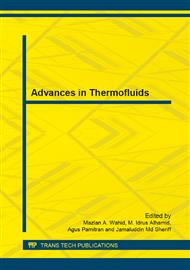p.217
p.223
p.229
p.235
p.241
p.246
p.251
p.257
p.262
Characterization of Diesel Engine Generator Operating at Different Compression Ratio Fuelled with Palm Oil Biodiesel
Abstract:
Experiment to determine exhaust gas emission and combustion characteristics of a compression ignition generator was carried out. The experiment used single cylinder four strokes direct injection engine which was fuelled with diesel and palm oil methyl ester of B2 (blends 2% palm oil methyl ester with 98% diesel on a volume basis), B5, B7 and B10. The experiment was conducted at a fixed engine speed of 3000 rpm and 50% load with variety compression ratios of 16:1, 18:1, and 20:1and 22:1. Optimum compression ratio, influence of compression ratio on specific fuel consumption and thermal efficiency were examined. Palm oil methyl ester produce better output when the engine operate with variable compression ratio. Specific fuel consumption decrease, NOx increase and thermal efficiency increase when optimum compression ratio of engine is operated.
Info:
Periodical:
Pages:
241-245
DOI:
Citation:
Online since:
August 2013
Price:
Сopyright:
© 2013 Trans Tech Publications Ltd. All Rights Reserved
Share:
Citation:


